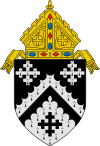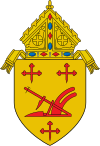Richard Gilmour
Richard Gilmour | |
|---|---|
| Roman Catholic Bishop of Cleveland | |
 | |
| Church | Roman Catholic Church |
| Archdiocese | Cincinnati |
| Diocese | Cleveland |
| See | Cleveland |
| Appointed | February 15, 1872 |
| In office | April 14, 1872 - April 13, 1891 |
| Predecessor | Louis Amadeus Rappe |
| Successor | Ignatius Frederick Horstmann |
| Orders | |
| Ordination | August 30, 1852 by John Baptist Purcell |
| Consecration | April 14, 1872 by John Baptist Purcell |
| Personal details | |
| Born | Richard Gilmour September 28, 1824 |
| Died | April 13, 1891 (aged 66) St. Augustine, Florida, U.S. |
| Buried | Cathedral Resurrection Chapel |
| Nationality | Scottish |
| Denomination | Roman Catholicism |
| Motto | Fides Et Caritas |

Richard Gilmour (September 28, 1824 – April 13, 1891) was a Scottish-born prelate of the Roman Catholic Church. He served as Bishop of Cleveland from 1872 until his death in 1891.
Biography
Richard Gilmour was born in Dumbarton, Scotland to John and Marian (née Callander) Gilmour, who were Reformed Presbyterians.[1] In 1829 he and his parents moved to Nova Scotia and later settled near Latrobe, Pennsylvania.[1] He received his classical education in Philadelphia, where he became acquainted with Rev. Patrick Rafferty, pastor of St. Francis Xavier Church, Fairmount, Philadelphia.[1]
His friendship with Rafferty eventually led Gilmour to convert to Catholicism in 1844, and he soon resolved to enter the priesthood. In 1846 he entered Mount St. Mary's Seminary in Emmitsburg, Maryland.[2]
In addition to his studies, he was named prefect of collegians and professor of mathematics in 1847.[1] After receiving his Master of Arts degree (1848) and completing his theological studies, Gilmour was ordained a priest by Archbishop John Baptist Purcell on August 30, 1852.[3]
He then served as pastor of St. Mary's Church in Portsmouth, Ohio, also doing missionary work in Ironton, Gallipolis, Vinton, and Wilkesville.[2] In 1857 he succeeded Rev. James Frederick Wood as pastor of St. Patrick's Church in Cincinnati, where Gilmour erected a parochial school. He briefly served as a professor at Mount St. Mary's Seminary of the West (1868–1869) before being named pastor of St. Joseph's Church in Dayton.[2]
On February 15, 1872, Gilmour was appointed the second Bishop of Cleveland by Pope Pius IX.[3] He received his episcopal consecration on the following April 14 from Archbishop Purcell, with Bishops Augustus Toebbe and Caspar Henry Borgess serving as co-consecrators, at St. Peter's Cathedral.[3] He founded The Catholic Universe newspaper in 1874, and successfully opposed attempts by the Cuyahoga County auditor to tax Catholic churches and schools.[2] He was also wary of the public school system.[4] He established St. Ann's Asylum and Maternity Home, St. Alexis Hospital, and St. John Hospital.
Death
Gilmour went to Florida in March 1891 due to failing health, where he died at St. Augustine, aged 66, on April 13, 1891.[2]
Legacy
Gilmour Academy, in Gates Mills, Ohio, is named in honor of Bishop Gilmour.
References
- ^ a b c d Houck, George Francis (1890). The Church in Northern Ohio and in the Diocese of Cleveland: From 1749 to 1890. Short & Forman Printers.
- ^ a b c d e "GILMOUR, RICHARD". Encyclopedia of Cleveland History.
- ^ a b c "Bishop Richard Gilmour". Catholic-Hierarchy.org.
- ^ Brownson's Quarterly Review (Last Series, Vol. 1, 1873, "The Church above the State", p. 353-354). Quote: "Catholics are too timid; they seem to go upon the principle that, if they are tolerated, they are doing well. This is a mistake; if we let our rights go by default, we should not wonder if we lose them. We must be decided in our demands, and present a bolder front to our enemies. It is unjust to so organize the public schools that we cannot in conscience send our children to them, and then tax us for their support. As well create a State Church, and tax us for its support." [1]
- 1824 births
- 1891 deaths
- People from Dumbarton
- People from Latrobe, Pennsylvania
- Converts to Roman Catholicism from Calvinism
- Roman Catholic Archdiocese of Cincinnati
- Christianity in Cleveland
- American Roman Catholic bishops
- 19th-century Roman Catholic bishops
- Roman Catholic bishops of Cleveland
- British emigrants to the United States
- Disease-related deaths in Florida




